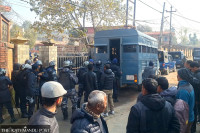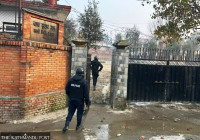Valley
Students say they are abused under guise of discipline at a Kathmandu school
Kathmandu Model College claims grievances addressed. Students find problems systemic.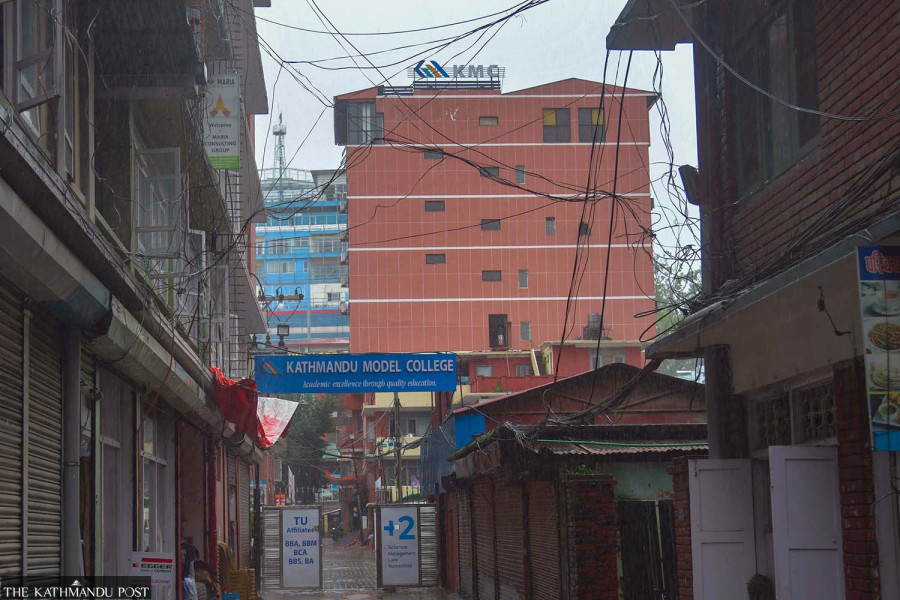
Aarati Ray
No bruises. No police report. No problem.
Abuse within educational institutions in Nepal rarely raises eyebrows or is even recognised as abuse.
But two weeks ago, the Kathmandu Model Secondary School, better known as Kathmandu Model College (KMC +2), a 20-year-old institution in Bagbazar, came under the spotlight after a post titled ‘Kathmandu Model College’s CI Staff Humiliate and Physically Assault Students’ was published on Reddit.
The post described how the college’s counselling incharge (CI) routinely harassed students under the pretence of discipline.
Over 200 comments, posts, and confessions on Reddit describe alleged physical punishments such as beatings, verbal abuse, public shaming and humiliation, manhandling, and intrusive body checks.
A week after the Reddit posts started trending, a TikTok account called ‘Truth’ emerged, sharing anonymous student confessions from the college. The page gained traction, amassing over 10.4k likes as of July 30, with individual videos getting hundreds of shares and comments, many of which echoed similar stories.
Previously, roles for discipline were titled as discipline in-charges (DIs) at educational institutions. Following Kathmandu Metropolitan City’s restriction on DIs, the Kathmandu Model College rebranded the position as CI.
“Yes, DIs are no longer permitted,” said Dhurba Kumar Kafle, assistant spokesperson for Kathmandu Metropolitan City. “But merely changing the title without altering the role is unacceptable, if it involves extreme disciplinary measures.”
To understand how the CIs and disciplinary measures function at Kathmadu Model College, the Post interviewed 16 former and current students.
One student from plus two, D13 section wrote on Reddit about a recent incident. Before the last period, 12 or 13 students had gone on a washroom break. When they returned, the computer science teacher denied them entry, and they were taken to the coordinator’s office.
“In the office, CI [Renon Rijal] asked if we had taken permission from the class representative or the teacher. We hadn’t, and yes, we agree that was our mistake. But the punishment was shocking.”
According to the student, Rijal ordered them to stand in silence before beating each of them, while the other CI, Subba Sah, stood watching. “He grabbed one by the collar for not wearing an ID and hit harder [sic],” the student wrote. “We were treated like criminals.”
“Kathmandu Model might excel academically,” the student added, “but the toxic behaviour of its CIs ruins everything.”
Another plus-two science student told the Post that even minor breaches of appearance rules invite harsh punishment. “My hair wasn’t long, but a CI still pulled it, and slapped me on the head,” he said.
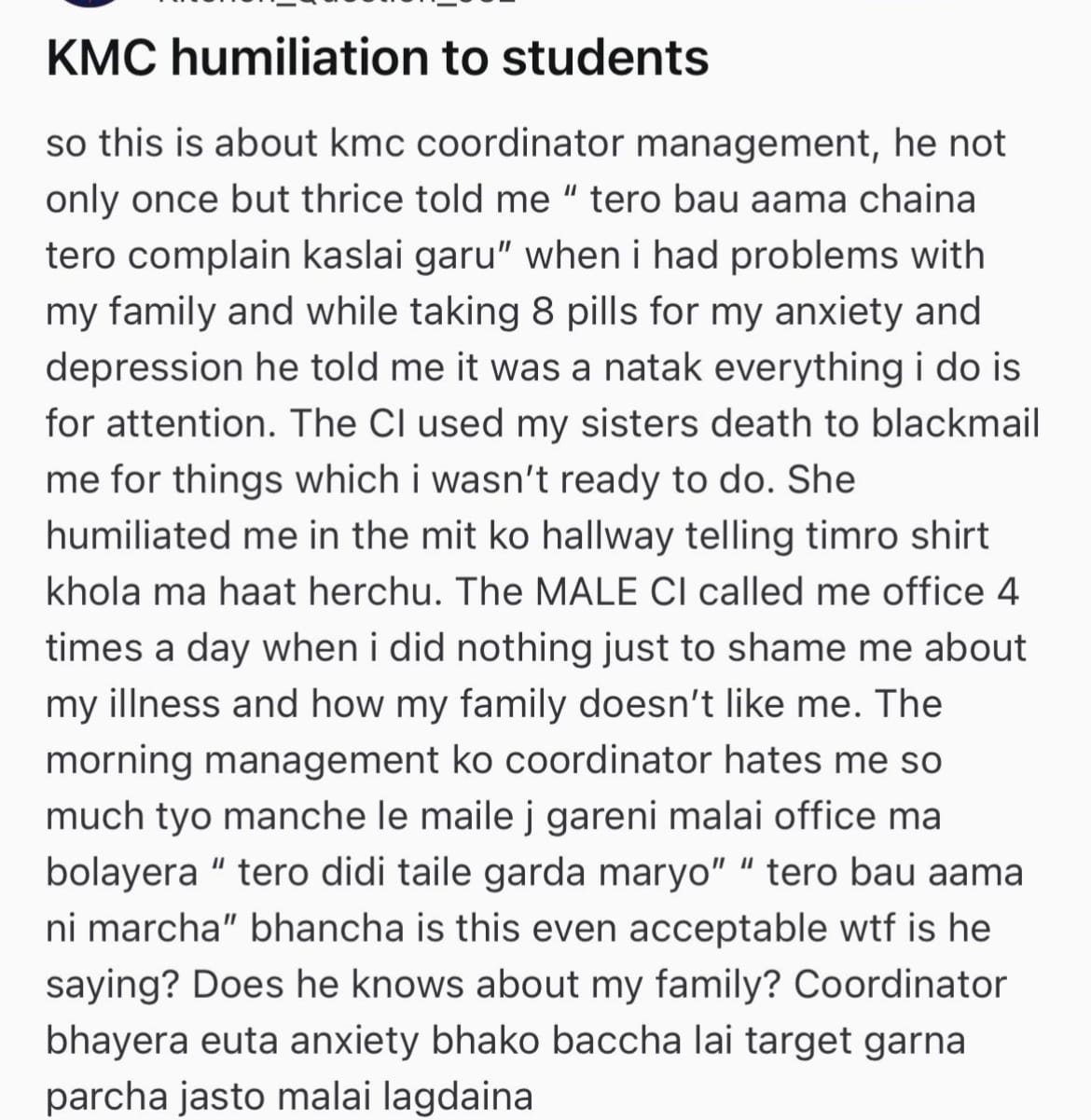
Kala, a management student, said the college’s restrictions go beyond makeup and they conduct intrusive body check ups in washrooms. “We have a basic sense to not come to college in full makeup. But the college bans even essentials like sunscreen, Vaseline, and lip balm,” she said.
She says such harsh rules are driving students to secrecy and rebellion.
Bhawana (a Grade 12 management student) was in Class 11 when her sister was battling cancer. The stress at home was overwhelming, and she often stayed at a friend’s house for some relief.
One day, she didn’t take the college van home and forgot to inform her parents. So, her parents called the college. Even after explaining the situation to coordinator Manoj Subedi, she was pulled out of class multiple times and sent to his office.
While the college claims to prioritise mental health by keeping a psychiatrist on staff, students say the college’s approach to mental health issues is dismissive at best. Bhawana, who was dealing with anxiety and on medication, says the response was cruel.
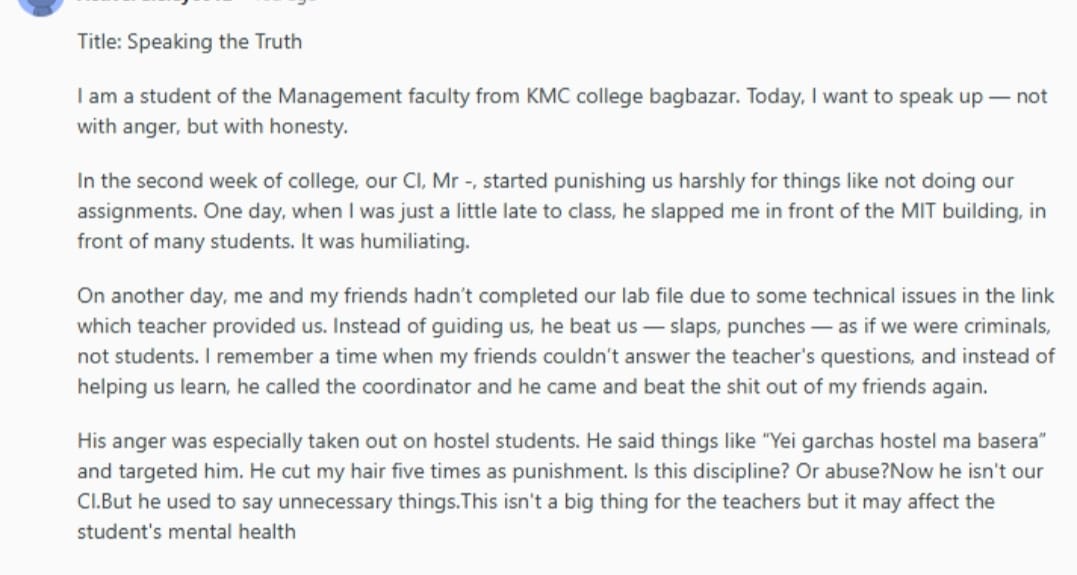
“Manoj sir accused me of faking it,” she said. “He said, ‘People on stronger medications manage fine—you just want attention.’” He would also taunt her with, “You don’t have parents. Who should I complain to? You’ve been abandoned by your parents,” all while insisting, “Chhori (Daughter), I am not scolding you”.
“Maybe I had problems with my parents,” she said. “But to say I’ve been abandoned, that was crossing the line.”
After her sister died that May, Bhawana missed a few classes. Upon returning, CI Tika Gautam scolded her for missing assignments: “Your sister died because of you. Now your parents will too; you’ll be parentless.”
Then there is the constant surveillance. Aashma, a Grade 12 law student, describes the college’s CCTV surveillance as oppressive.
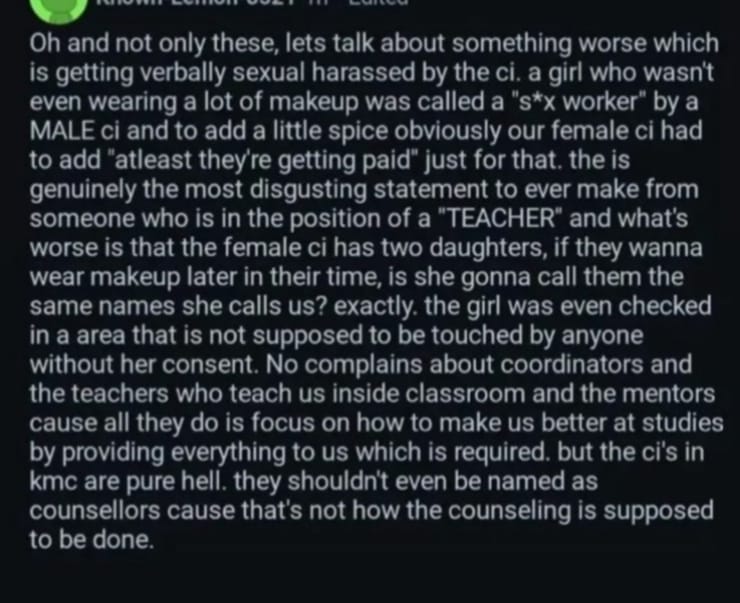
In the science faculty, surveillance is even tighter, with CI patrolling hallways with walkie-talkies. Minor actions, like adjusting a seat or whispering, are flagged, and they are called to CI’s office. She shared how classmates were often pulled out of class for the smallest things, with their parents urgently called and told, “There’s an emergency… please come to the college,” without any explanation, causing panic.
“CIs constantly watch CCTVs,” Aashma added. “We came here to study, not to be treated like criminals in prison… It’s suffocating.”
At Kathmandu Model, students say there is no safe mechanism to raise grievances. While class representatives are expected to submit applications when students face problems, those complaints are rarely acknowledged.
Palki, who completed her plus two in 2025, shared how even restroom breaks were controlled. “Male CIs would come to the restroom doors and shout at us to return to class, even before the break ended,” she said. “It felt intrusive.”
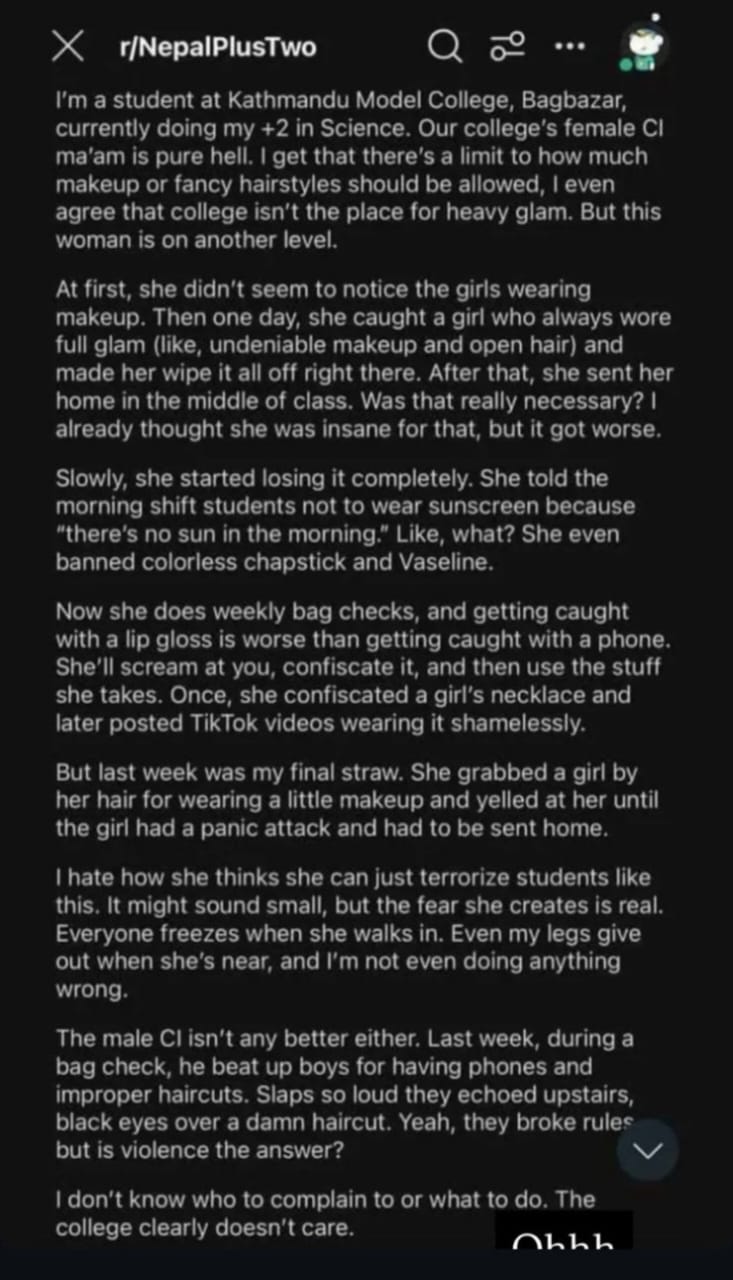
She recalled being reprimanded for minor things with misogynistic remarks by male CIs like, “Being a girl, how can you do this? You have to behave and stay in line–like a girl.”
At the time, Palki, who was a law student, brushed it off. But after returning as a volunteer intern at Kathmandu Model in June, she saw more systemic problems.
She recalls an incident where a male student was slapped twice in front of the class, then taken to the office by CIs Rijal and Sah, where he was slapped again. “The boy was in tears, but they kept hitting him,” Palki said.
Moreover, she says science students are often beaten and humiliated at the gate even for missing to bring an umbrella or a water bottle.
When she confronted the CIs, their response was “Kathmandu Model is a big organisation. Students like these need to be handled this way,” the CIs told her. “You don’t understand science students—this is how it’s done. Parents have permitted us to beat them.”
For Ruhani, a graduate of 2024, the control extended beyond the classroom into the hostel. “It was a form of extreme mental torture,” she said.
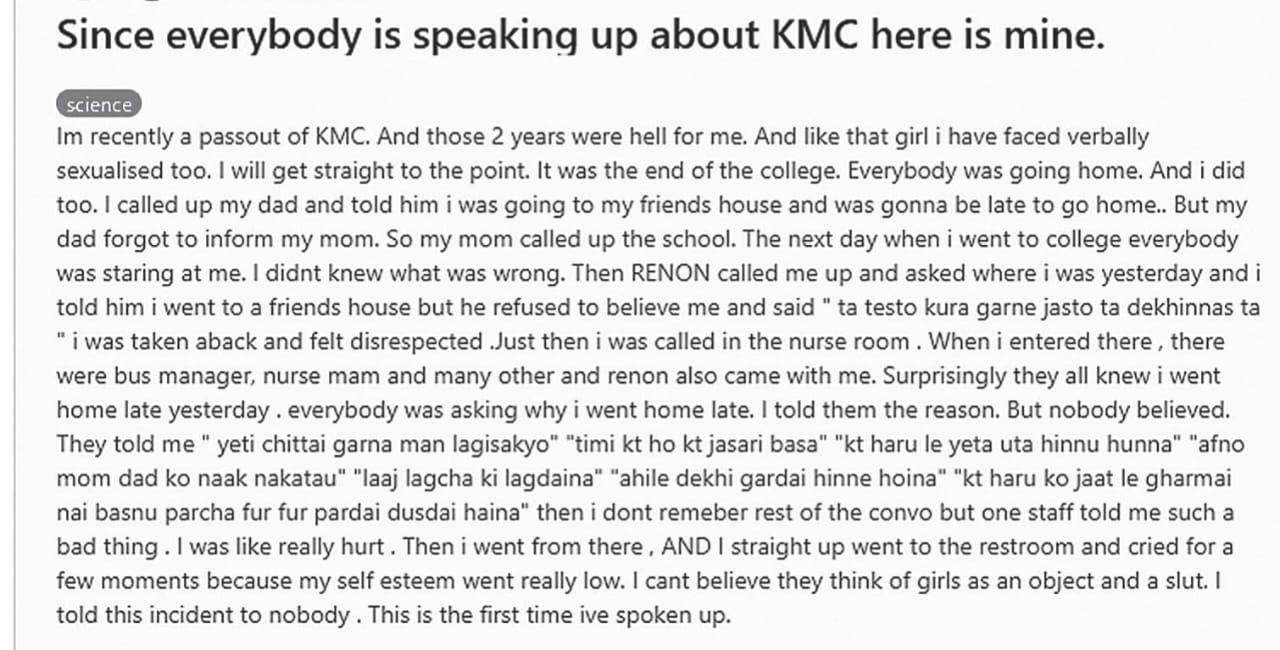
The primary rule there, she says, was not to share anything about the hostel with parents. If someone did, the warden would find out and retaliate.
Even a few moments in the sun to dry clothes were suspect. “We couldn’t sit on the terrace to dry our hair during winter. If we did, wardens would yell, ‘Who are you trying to show off to… What indecent relation do you have with boys?” she said. The boys’ hostel, though far away, was visible from the terrace—near enough to fan baseless accusations.
At the Kathmandu Model hostel, students are required to wear a designated tracksuit. One current Class 12 science student described the constant objectification and sexualisation of girls’ bodies. Even on laundry days, strict dress codes applied: no half-sleeves, no visible skin. “We were told it could ‘distract male teachers,’” she said.
Reflecting on its psychological toll, she said, “Imagine being 15 or 16, and being told to cover up, not for your own sake, but because your teachers might have inappropriate thoughts,” she added.
Manish, a former student from 2021, says there’s structural discrimination against students from less privileged backgrounds and also racism against Madhesi students. “The punishments for infractions were harsher,” he said. “They even used the term ‘Madhishe,’ a derogatory term.”
Impact on students
Mental health experts say that the culture of fear-based and punishment-driven discipline, which is normalised in Nepal’s education system, is psychologically damaging.
“Slapping, yelling, name-calling, these are often dismissed as harmless or even necessary,” said mental health counsellor Shradha Gadtaula. “But repeated exposure to such treatment rewires the brain’s stress response, affecting emotional regulation, learning ability, and long-term mental health problems like depression.”
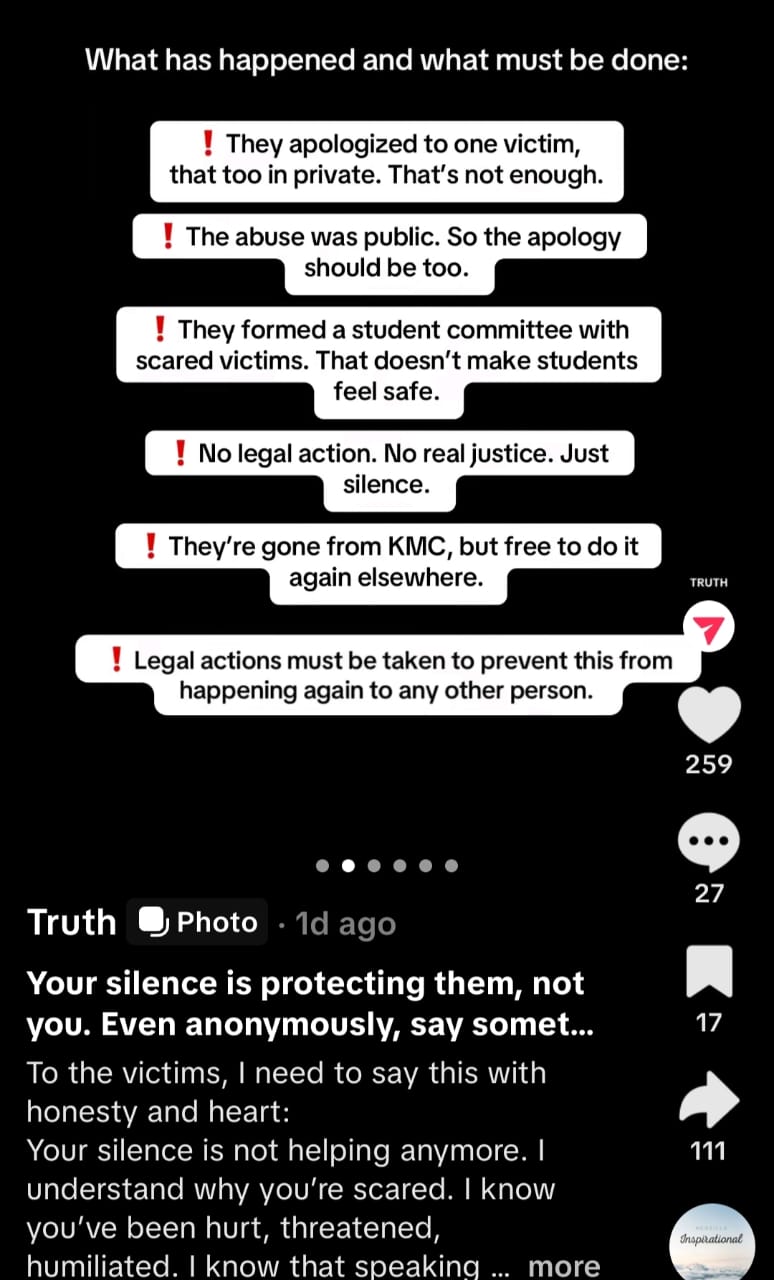
She says casual verbal abuse, words like ‘dimag nabhako’ or saying ‘you are useless’ can slowly destroy a student’s self-worth. She has seen cases where these had led students towards self harm like cutting their hand.
According to educationist Dr Amina Singh, a major problem in many of Nepal’s academic institutions is the assumption that beating, scolding, or enforcing arbitrary appearance rules is ‘discipline’ and enhances learning.
“As an educator, I must question, what’s the connection between a student’s hairstyle or use of makeup and their academic ability?” added Singh. “I don’t see any, and these are based on patriarchal, punitive, archaic and hierarchical notions of control.”
According to Researcher Pritha Dahal, these practices are so normalised that even when abuse surfaces, institutions just suspend or fire a few staff as damage control,” she says. “But the same problems resurface. Where’s the reflection on their disciplinary measures and on the obsession with producing doll-like, submissive students?”
What’s urgently needed is not another round of performative apologies or superficial reform, stresses Singh. According to her, institutions must engage in self-reflection on what discipline actually means, and be committed to redefining education by ensuring safety, respect, and student agency.
College’s response
When questioned on July 25, Kathmandu Model’s Deputy CEO Ram Neupane dismissed the allegations, saying, “We treat all our students like our own children.”
He described the anonymous Reddit posters as ‘academically poor’ and ‘given up on by their parents’, even suggesting, “You shouldn’t believe claims made by those who take medication [for mental health].” Still, he acknowledged that two CIs had been suspended for a week pending investigation.
Later, Anish Dhakal, another deputy CEO, confirmed that the two suspended CIs repeatedly named in students’ posts (Renon Rijal and Pragya Acharya) have been permanently dismissed.
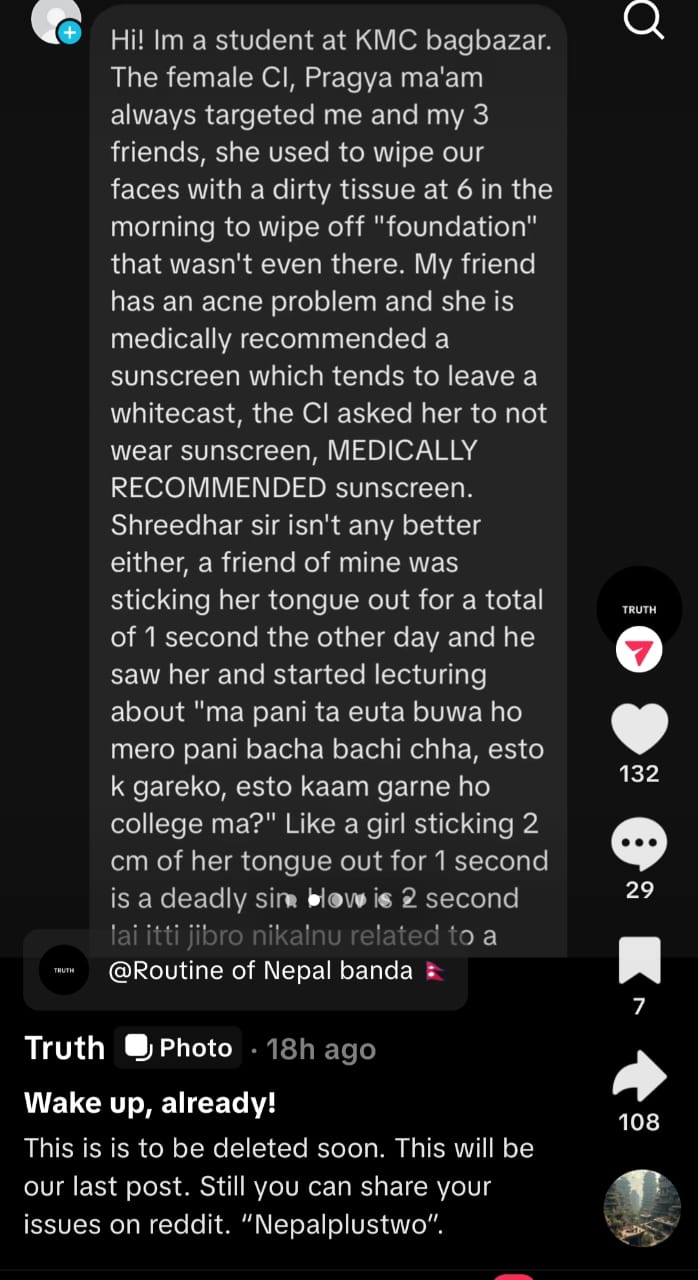
He further claimed all issues have been resolved after meetings with students. “The claims that abuse at Kathmandu Model is systemic are wrong,” Dhakal said. “The incidents shared online could be rare isolated cases”.
“Many have even deleted their original posts, and the TikTok account that was active is now down. It must be because their grievances were addressed,” he added.
To improve grievance redressal, the college has even opened applications for a new student committee.
But for many students, these steps have done little to restore trust, especially as some who anonymously posted about abuse on Reddit are now being investigated by the Cyber Bureau of the Nepal Police.
The investigation is being undertaken to identify the person behind the TikTok account “Truth,” which, in its last post, suggested foul play by the college in a recent student suicide at Kathmandu Model College, Lalitpur.
While students allege the case was filed by the college to silence victims, Dhakal denies the claim.
But according to Deepak Raj Awasthi, spokesperson for the cyber bureau, it was indeed the college which filed the case. “Obviously, the college management sent us the application [for investigation],” he said.
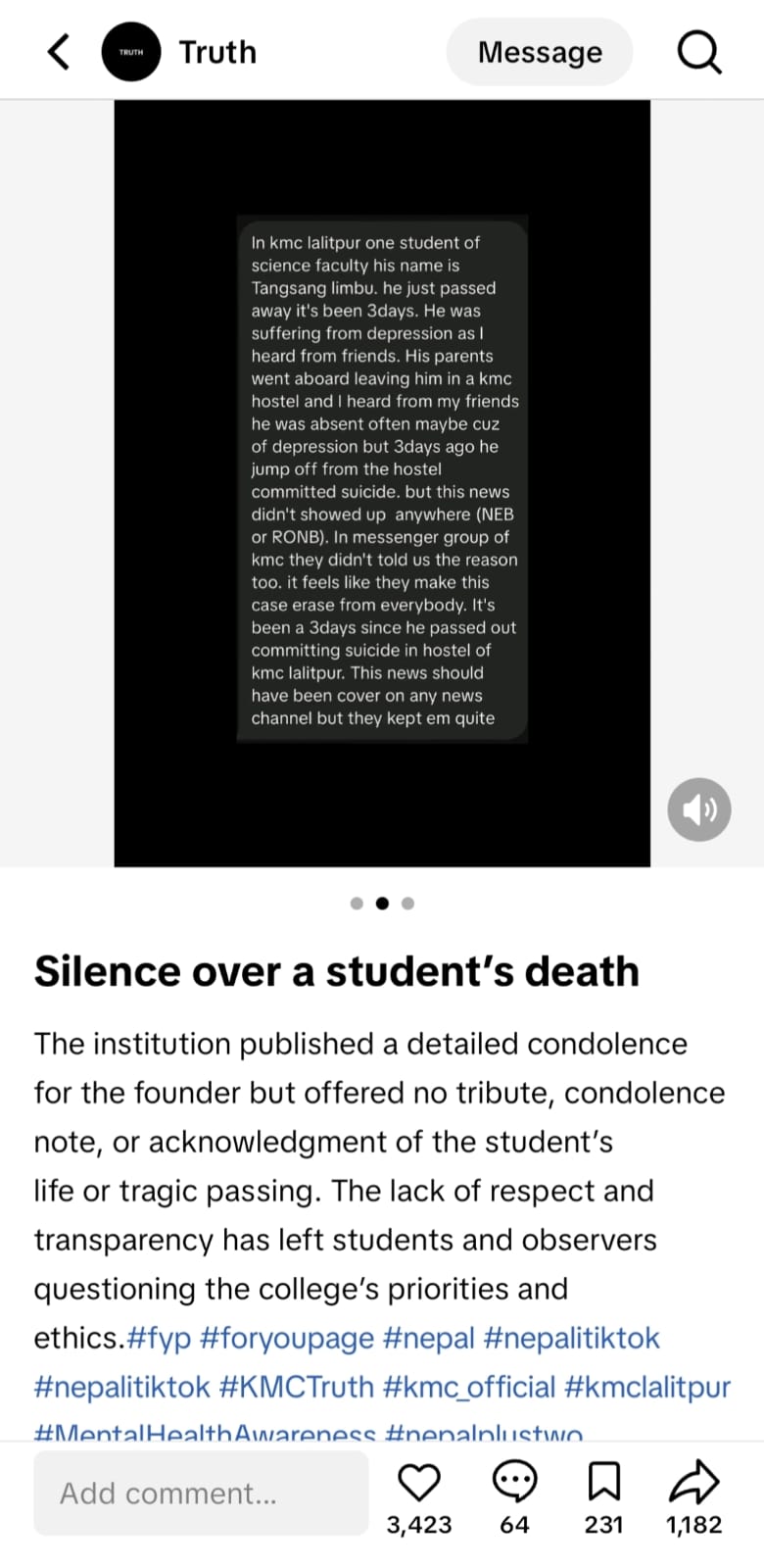
Awasthi says the college strongly believes that one of the students is behind the TikTok posts and wants the bureau to help verify the identity so they can consult the student’s parents and take action based on college’s rules.
Students say that regardless of the legal outcome, involving law enforcement in a case tied to abuse allegations sends a chilling message.
“Maybe the case will be dropped, but the damage is done,” said a plus-two student. “It was the college that took the victims from its own premises to the bureau. Many are now deleting their posts. The message is clear: if you speak out, you will face consequences.”
Students are unhappy with how the administration has been more concerned with damage control than accountability.
There hasn’t been any honest reflection or acknowledgemnt from the college on its toxic, punishment-driven disciplinary culture, said a Grade 12 science student who is living in the college hostel. “They still see it as normal.”
“Perhaps the Cyber Bureau was just doing its job, but I kept thinking—why were we, the victims, being interrogated for speaking out, while the institution itself faced no scrutiny,” a student under investigation asked.
(All student victims have been identified with pseudonyms)
These recent screenshots show Kathmandu Model College students, using anonymous identities on social media site Reddit and TikTok, complaining about harsh treatment and verbal abuse by counselling in-charges and the hostel warden.




 10.12°C Kathmandu
10.12°C Kathmandu



